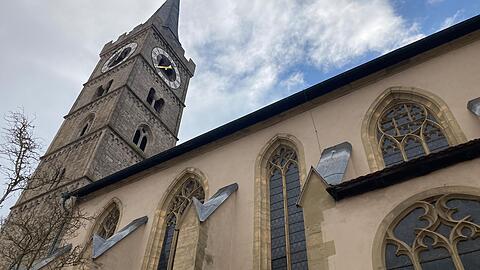The Diocese of Würzburg also knows the problem: staff shortages. Fewer and fewer young priests come to the Catholic Church, the rest have to take on more and more tasks, and it is no longer so easy to find volunteers. The diocese has realized that this change cannot be addressed through the existing structures. For this reason, the process of reorganization has been underway for some time: instead of the previous deans, the diocese was divided into the so-called parish chambers. One of them is currently being built in the Ochsenfurt district. Priests Oswald Sterngel of Auchsenfurt and Franz Schmidt of Frickenhausen explain what this means for local Catholics.
The central message, which may seem a little strange in this context, is: Get away from narrow thinking. Administrators of individual parishes will not only consider their parishes or parish communities, but the entire parish area. And in terms of space, it has a significant expansion, as it is almost identical to the former dean’s office in Ochsenfurt. Franz Schmidt emphasizes that the process of reorganization is not yet complete. Therefore, the two chaplains cannot currently provide a definitive concept of how the organization will look in the future. But there are already many ideas.
A central hotline can be envisaged for all believers
And Oswald Sterngel has an example: if someone dies in a village, but the priest is ill or otherwise prevented, the improvisation has to be done so far, eg by the clergyman of the neighboring parish who steps in. In a pastoral space, for example, an on-demand service could be set up to coordinate funerals throughout the area. This, says Sterngel, is a new approach in the church, in which the territorial structure is very clear.
It is also possible to set up a central hotline that all believers can contact if they have concerns. So far, the respective parish office is the right point of contact. It will also be possible to create a common appointment calendar for all. Of course, this requires appropriate technical requirements, training, and knowledge for full-time employees, says Oswald Sterngel.
For many, the church is a piece of home and a tradition
The two priests describe a change in the way of life as well as in the expectations people have of the church today. Oswald Sternagil says the classic Sunday service is no longer important to everyone. Or, adapt to your own preferences away from your home town. Many looked at what the church had to offer from the perspective of the event. It is used in high church ceremonies or when important life events such as baptisms or weddings are imminent.
On the other hand, the parish, especially in small towns, is a piece of home and tradition and also a meeting point, explains Sternagil. Residents are active in the sports club, firefighters – as well as in the church community. Nobody should be afraid that this could be snatched from them. But something would be different. Yet there is no gathering in every village every Sunday. The two men say the fact that there are celebrations of God’s word and other performances is largely thanks to the volunteers.
Volunteers are an asset and should not be overwhelmed
They should be involved in the operations in the pastoral area just like full-time employees. Oswald Sternagel explains that if a pastor did not attend every event, but was a volunteer and trained member of the church, this should be understood as being exactly equal. “These are not temporary measures, but a collected treasure, enrichment.” Franz Schmidt adds that service representatives are highly valued employees. It is critical that full-time employees not confuse fellow volunteers in the new pastoral space. Schmidt says that those who work in Caltensundheim, for example, don’t have to worry about being posted to Taubertsheim.
“In the coming years, full-timers and volunteers will look for a good way together,” says the Reverend from Frickenhausen. In the pastoral district of Ochsenfurt, actors want to confront this change with an open mind, explains Oswald Sternagel. This means goodbye to some, but also courage to something new. The pastoral space will be formally erected at the church ceremony at the beginning of May.
Pastoral room in Ochsenfurt
Ochsenfurt Pastoral District It is one of 43 in the Diocese of Würzburg. In the area we live around
17,600 Catholics in 39 parishes, five korats, and two branches. These belong to the seven parish communities of Ob-Gelchheim, Emmaus-Frekenhausen, Gebelstadt-Potthard, Oxenfurt, Tüber-gau, Röttingen, Tokelhausen, and zu den Schutzingelen im Gau-Gokonigshofen. These also remain in the pastoral space.
In every church community The previous parish council becomes a parish team. Volunteers in each parish community make up the joint parish council. The parish team and joint parish council elections will be held on March 22nd. Seven delegates from the pastoral councils make up the Council of Pastoral Space, which, together with the team of pastoral pastors, make up the further development of the pastoral space. This is coordinated by a steering group.
Source: CSC / Pastoral Space Public Relations Working Group

Communicator. Reader. Hipster-friendly introvert. General zombie specialist. Tv trailblazer

